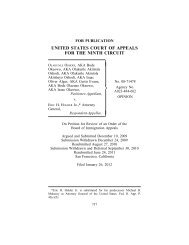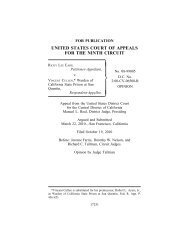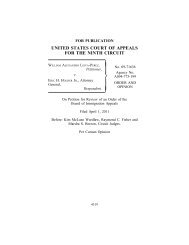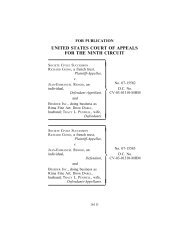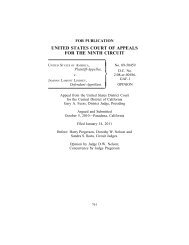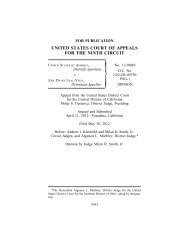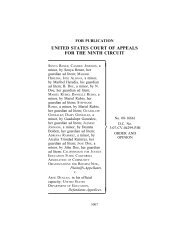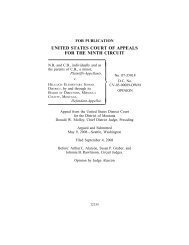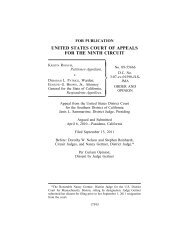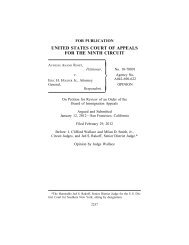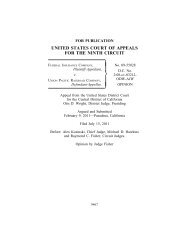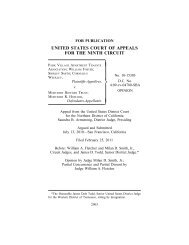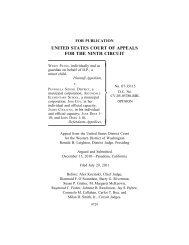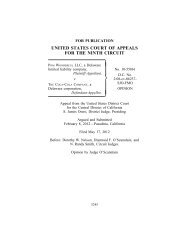USA v. Xavier Alvarez - Ninth Circuit Court of Appeals
USA v. Xavier Alvarez - Ninth Circuit Court of Appeals
USA v. Xavier Alvarez - Ninth Circuit Court of Appeals
Create successful ePaper yourself
Turn your PDF publications into a flip-book with our unique Google optimized e-Paper software.
UNITED STATES v. ALVAREZ<br />
11889<br />
(1970), or “lusty and imaginative expression,” Nat’l Ass’n <strong>of</strong><br />
Letter Carriers, AFL-CIO v. Austin, 418 U.S. 264, 286<br />
(1974), such as satire or fiction. In Hustler, the Supreme<br />
<strong>Court</strong> held that the First Amendment protects defamatory<br />
statements about a public figure “that could not reasonably<br />
have been interpreted as stating actual facts about the public<br />
figure involved.” 485 U.S. at 50. And in Milkovich v. Lorain<br />
Journal Co., 497 U.S. 1 (1990), the <strong>Court</strong> clarified that such<br />
protection “provides assurance that public debate will not suffer<br />
for lack <strong>of</strong> imaginative expression or the rhetorical hyperbole<br />
which has traditionally added much to the discourse <strong>of</strong><br />
our Nation.” Id. at 20 (quotation marks omitted)); see also<br />
Knievel v. ESPN, 393 F.3d 1068, 1074 (9th Cir. 2005) (stating<br />
that “[t]he First Amendment protects statements that cannot<br />
reasonably [be] interpreted as stating actual facts about an<br />
individual” because <strong>of</strong> “the reality that exaggeration and nonliteral<br />
commentary have become an integral part <strong>of</strong> social discourse”<br />
(quotation marks omitted) (second alteration in original)).<br />
In a sense, the <strong>Court</strong> has established that “lies” made in<br />
the context <strong>of</strong> satire and imaginative expression are not really<br />
lies at all and perhaps not really even statements <strong>of</strong> “fact,”<br />
because no reasonable listener could actually believe them to<br />
be stating actual facts.<br />
In sum, the Supreme <strong>Court</strong>’s jurisprudence on false statements<br />
<strong>of</strong> fact involves a general rule with certain exceptions<br />
and exceptions-to-exceptions. In general, “there is no constitutional<br />
value in false statements <strong>of</strong> fact,” and so “the erroneous<br />
statement <strong>of</strong> fact is not worthy <strong>of</strong> constitutional<br />
protection.” Gertz, 418 U.S. at 340. However, this general<br />
principle is subject to certain limited exceptions where First<br />
Amendment protection is necessary “to protect speech that<br />
matters,” id. at 341, and to ensure that the “freedoms <strong>of</strong><br />
expression . . . have the ‘breathing space’ that they ‘need to<br />
survive,’ ” New York Times, 376 U.S. at 271-72 (alteration<br />
omitted). Accordingly, a defamatory false statement <strong>of</strong> fact<br />
made about a public figure is constitutionally protected if it is<br />
made without “knowledge that it was false or with reckless



